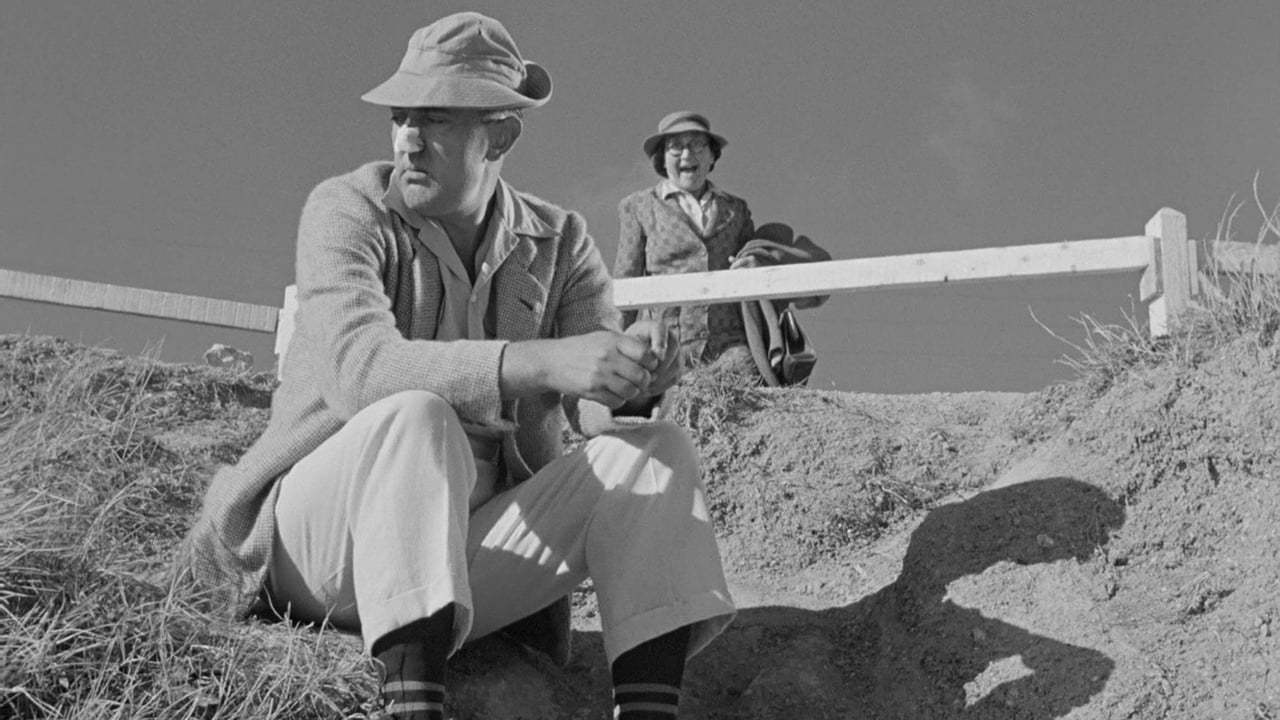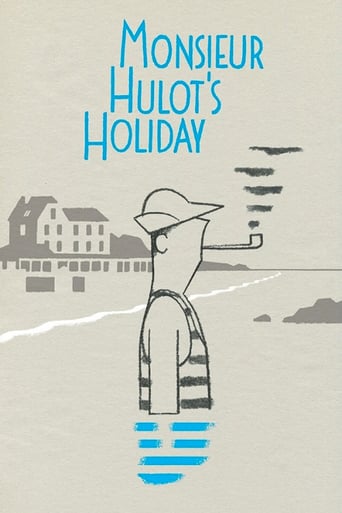

Query: Why are some vehicles Right-Hand-Drive? Even imported cars should be converted. Great comedy moment: M. Hulot's sportscar is so small that he can reach across to sound the horn situated outside on a spare tyre on the opposite side of the steering wheel!
... View MoreLes Vacances De Monsieur Hulot is the first in one of the most recognizable sagas in French cinema (preceding Mon Oncle, Play Time and Trafic in the Hulot series). The movie follows m. Hulot through sometimes thoughtful, sometimes easy visual jokes while he is on holiday at the beach town of Saint Sévère. The film doesn't really have a plot or a beginning, middle and end, or any major event that catalysts the story or that even moves it forwards. Aside from when Hulot arrives and leaves the town, everything consists of sketches and sketches of unspoken hilariousness.Despite the first traces of the visual genius that Tati would later become and his obvious ability to do meaningful flawless comedy (as with Mon Oncle and Play Time), we here have some sketches that are trying far too hardly to make us laugh (as when Tati dresses a s pirate or plays tennis), but places them intelligently between the best jokes the film has, some of them that still remain as classics (like the old couple picking up seashells or the funeral scene). What we can also notice in this film is the absence of a central idea or anything that Tati tries to tell us here, which for me would be alright in any other normal comedy, but I personally expected more out of Tati, having seen the anti-technologist and anti-modernist pieces Mon Oncle and, especially, Play Time.Les Vacances De Monsieur Hulot is a sketch-based holiday-themed visual comedy with a traditional yet sometimes clever direction, an Oscar nominated funny screenplay and an extremely hilarious soundtrack that consists only of one song played over and over again.Rating: 4/5.
... View MoreThe importance and influence of French comedy master Jacques Tati's most famous character Mr. Hulot is not to be underestimated: his nearly silent antics carry on the non-verbal tradition from the earliest decades of cinema and his iconic style lives on in more recent comedy characters such as Rowan Atkinson's Mr. Bean. The 1953 film classic Mr. Hulot's Holiday marks the first appearance of the lovable Monsieur and was also Tati's breakthrough success to international audiences.The plot of the movie is pretty neatly summarized by the title "Mr. Hulot's Holiday". At the beginning the eponymous clumsy and pipe-smoking but always polite loner (played by Tati himself) arrives in a sunny beach resort somewhere in France along with many other tourists ranging from a workaholic businessman to a politics-obsessed intellectual and a beautiful young woman named Martine (Nathalie Pascaud). Hulot is planning to take it easy on his holiday (like he always does) but it looks like his presence keeps inadvertently causing various unexpected incidents at the resort.Just like in the later Hulot films, Tati utters few words in the lead role and allows others do the talking when necessary. Most of the time he relies on visual gags that he finds in the most mundane of things: a swinging door at the hotel, the flowing sugar dough of an ice cream seller, a noisy jazz record, Hulot's malfunctioning antique car... In many scenes creative sound effects have a much bigger importance than dialogue: a squeaky car horn, a mumbly train station loudspeaker, the swinging door... Music is used more sparingly than could be expected, but the relaxing tunes on the soundtrack are a joy to listen whenever they are heard, even though the sound quality was not the best available in the version I saw.In spite of the sunny and light atmosphere that differs from the urban settings of the other Hulot movies, there is a very melancholic undercurrent running under the surface of the story. Hulot remains so alone from start to beginning (despite getting some attention from the beautiful Martine and the other tourists) that his character just cannot be dismissed as a mere buffoon. Even though he doesn't seem to mind spending time by himself, he is obviously out of place among the busy normalcy that surrounds him wherever he goes. At least to me this outsiderness is more than just nostalgia for "good old times" when such personalities had it easier to find their place in society; it is something that resonates with most people at one point or another in their lives. Like in the next Hulot film Mon oncle (1958), children are the ones who Hulot gets along with best... perhaps both share the feeling of being on a different level than the expected form of a responsible adult.Anyway, back to the movie... The first two times I saw Les vacances, I didn't care for it much since it felt too slow-paced and much longer than it actually is. Now, after having seen other Tati films and learning to appreciate comedies on a broader level than as simple joke automats, I notice I like Les vacances a lot more than before. It is not an aggressive laugh riot, nor does it attempt to be, but instead offers a nuanced tragicomic tale for more mature tastes. As one of the shorter Hulot movies, it can also serve as a good introduction to Tati's cinema, even though personally I saw the appeal of Mon oncle before Les vacances. At any rate, both films are classics worthy of their reputations, must-sees for film buffs and quietly amusing comedies in their own right.
... View MoreThis is a languid, poetic comedy, with the sounds and the slapstick judged and timed to perfection. It all ends up rather wistfully - of course, they'll be back in Saint Marc Sur Mer next year. Won't they...? The eternal joy and melancholy of summer holidays at the seaside is distilled in this majestically economical, precise film.I once cited this in a song of mine; concerning, appropriately enough, a speculative scenario of Britain and France merging into one country - as could easily have happened in the mid-1950s. Indeed, we have interesting scenes of the aloof Hulot's interactions with some archetypal genteel English holidaymakers - the glorious tennis sequence.The use of sound is masterful; everything from distant radio frequencies to the ping-pong of tennis balls, to a creaking door, is turned into a clockwork ballet of comedy: syncopated rhythms eventually dissolving into chaos and absurdity. And there is Alain Romans' lovely score: all Gallic sophistication and forlorn vibraphone, it captures the essence of the film perfectly.Anyway, great film; this is one for those who prefer their comedy to be like a fine wine, rather than an 'Xtra-Large' soft drink.
... View More